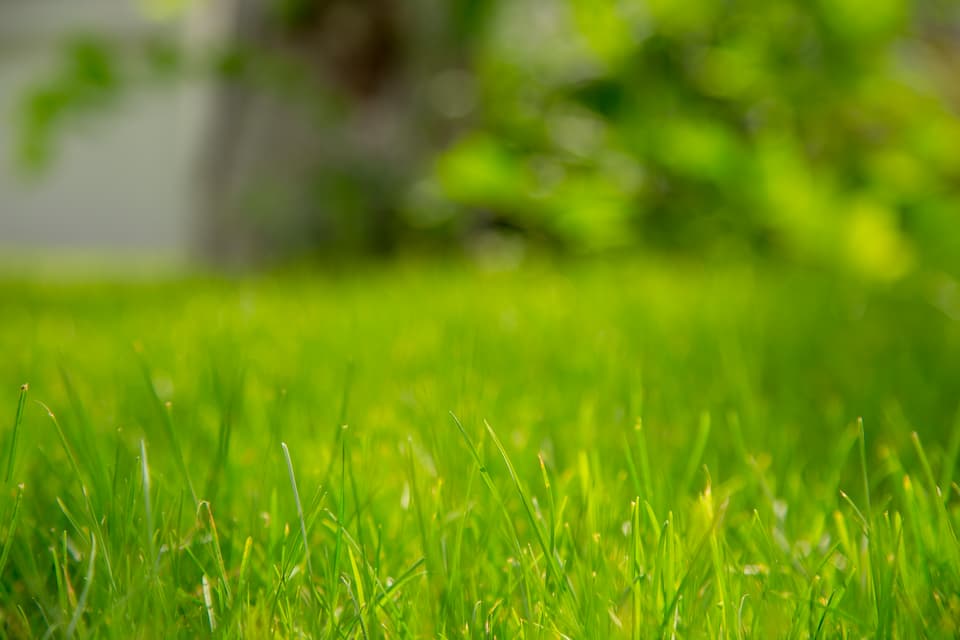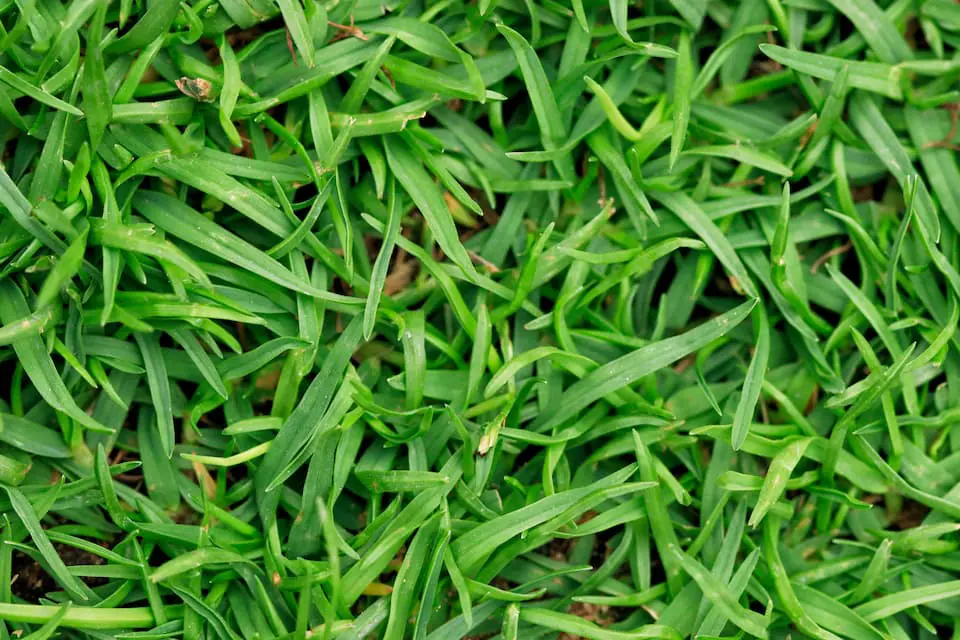Bermuda grass is one of the most popular grasses that you’ll find in the South. It can withstand heat and drought conditions, making it a favorite in Wake Forest. One of the best ways to keep your Bermuda grass healthy and plush is to fertilize it.
To help you obtain a plush lawn, our lawn fertilization pros are going to take a closer look at how to best fertilize your lawn and take care of your Bermuda grass all year long.

Importance of Proper Fertilization for Maintaining a Lush Bermuda Grass Lawn
If you want your Bermuda lawn to look its best, fertilizing it can not only encourage growth but also prevent the spread of many lawn diseases. When you spread fertilizer on Bermuda grass, you are strengthening it against heat, pests, and drought conditions. All of these can severely impact the condition of your Bermuda grass.
Understanding Bermuda Grass
Bermuda grass has several characteristics that make it a unique and popular choice for lawns.
Understanding Bermuda Grass Growth Patterns
Bermuda grass is fine and has a dense growth pattern which lends itself to a lush appearance. It can grow in many different types of soil but prefers soil that is well-drained and with a pH between 6.0 and 7.0.
When you have Bermuda grass, you can expect to have to feed it during its growing season due to its excessive growth rate. Bermuda grass spreads above-ground stems and below-ground stems.
Nutrients Required by Bermuda Grass and Their Functions
Potassium, nitrogen, and phosphorus are all essential nutrients for Bermuda grass to grow and thrive.
Nitrogen is the most important nutrient for grass to grow. It allows blades to grow straight and strong. It also gives grass its vibrant color. If grass doesn’t have enough nitrogen, it won’t grow properly and won’t have a lush green appearance.
Potassium is an activator for other minerals and nutrients. It also helps the grass to withstand pests and extreme temperatures.
Phosphorous is also critical if you want your grass to grow and stay healthy. If there isn’t enough phosphorous in the soil, it can limit growth and even make your lawn weak.

The Role of Fertilization in Bermuda Grass Care
How Fertilizer Contributes to the Health and Appearance of Bermuda Grass
Fertilizer helps to provide the essential nutrients your lawn needs to grow and stay healthy. When you fertilize your lawn, it will be healthy, green, and lush. When your Bermuda lawn is well-fertilized, it is less likely to be damaged by pests and diseases.
Determining the Ideal Time to Fertilize Bermuda Grass
Factors to Consider When Determining the Optimal Fertilization Schedule
When it comes to determining the optimal fertilization schedule for your lawn, you have to consider factors like the soil temperature, watering schedule, and the time of year.
Generally, it’s best to fertilize between March and August. This is when Bermuda grass grows the most. When you fertilize during this time, it will help your grass to stay green through the summer. Once your lawn is fully green and dense, you can switch to a slow-release fertilizer. This will slow the growth of your lawn, so it doesn’t become overgrown.
Monitoring Soil Temperatures
Methods for Measuring Soil Temperatures Accurately
It’s best to use soil thermometers to accurately measure soil temperature. You want to measure the temperature in the first part of the day. If you wait until later in the day, the sun will warm the soil and it may still be chilly from any night frosts. Checking the soil during the growing season is the best way to see how healthy the ground is.
You can also use a meat thermometer to measure soil temperature. If you use this type of thermometer, be sure it can test to temperatures of 40 degrees and lower. Before using a meat thermometer, you want to rinse it and dry it thoroughly.
Fertilization Schedule Based on Soil Temperatures
When the soil temperature is between 65 and 75 degrees, Bermuda grass will germinate best. It will grow and maintain its green color throughout the summer months before it goes dormant in the winter.

Best Practices for Fertilizing Bermuda Grass
Pre-Fertilization Preparations
Before you apply fertilizer, you’ll want to apply a pre-emergent herbicide in the middle of February or March. Bermuda grass can be more susceptible to weeds germinating because its defense is low from being dormant in the winter.
You’ll also want to make sure you water your Bermuda grass at least once a week. Deeply water the roots until they are well saturated. If you’re not sure, you can probe the soil with a stick to see if the soil is moist. Determining the soil’s texture is important. You don’t want your Bermuda grass to be oversaturated. If it is consistently wet, it can be more susceptible to fungus and weeds.
Also, keep an eye on your lawn’s irrigation before fertilizing Bermuda grass. Proper irrigation will help to keep your lawn healthy. This will prevent pest problems and lead to a healthier lawn.
Choosing the Right Lawn Fertilizer Formulation for Bermuda Grass
As you start looking at different types of fertilizer, you’ll notice that they are distinguished by how much nitrogen, phosphorous, and potassium they contain. All fertilizer bags are clearly labeled with these three numbers known as the N-P-K ratio.
Slow-release fertilizers with a 3-1-2 ratio are often recommended. Most lawn fertilizers have a combination of soluble and slow-release forms of nitrogen. Slow-release nitrogen is available over a period of two to three months while soluble nitrogen is available right away. It’s often recommended to avoid quick-release fertilizers because they can lead to wild and unpredictable growth spurts.
When you want to choose the best fertilizer, you can count on the professionals at Fort Smith Landscaping. We can recommend the right type of fertilizer for Bermudagrass lawns.
Common FAQs About When to Fertilize Bermuda Grass
Can you fertilize Bermuda grass too much?
Yes, you can fertilize Bermuda grass too much and possibly kill the grass. In many cases, fertilization is only needed 3-4 times.
Can you use 10 10 10 fertilizer on Bermuda grass?
You can use a 10 10 10 fertilizer on Bermuda grass, but it’s best to consult a lawn care professional to see if it’s best for your lawn. After doing a soil test, you may realize that another type of fertilizer blend is best.
Can you fertilize Bermuda grass in the fall?
Generally, it is not the best time to fertilize Bermuda grass. Early summer to mid-summer is typically the best time. If you want to fertilize in the fall, be sure to do it in early fall.
How do you winterize Bermuda grass?
Once the Bermuda grass becomes dormant for the winter, you’ll want to water it frequently. This will prevent the soil from drying out. While winter is not the best time to apply fertilizer to your Bermuda grass, some homeowners choose to add line or sulfur if they need to adjust the soil’s pH level.
Some homeowners also choose to overseed during the winter. This can repair bare spots and lead to a healthy lawn in the spring and summer.
Optimize the Timing of Your Bermuda Grass Fertilization with FortSmith Landscaping
When it comes to fertilizer application, early spring through August is the best time. You also want to keep an eye on soil temperature, as some temperatures are not as favorable for fertilizer as others. Always maintain a consistent fertilization schedule for optimal lawn health.
At FortSmith Landscaping, we are committed to helping you have a plush lawn year-round. We can help to create a fertilization schedule for your Bermuda grass lawn. Our fertilization services will not only help to keep your lawn looking great but will also help with weed control. Discover what a properly fertilized lawn looks like and how you can achieve it. Call us today at (919) 228-8495 to schedule an appointment.
